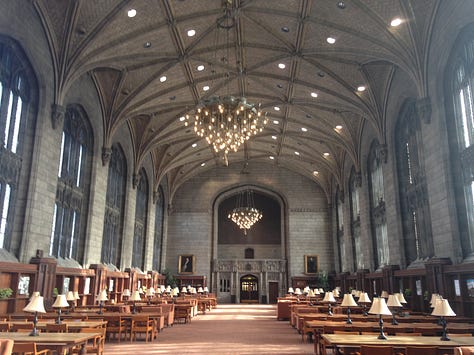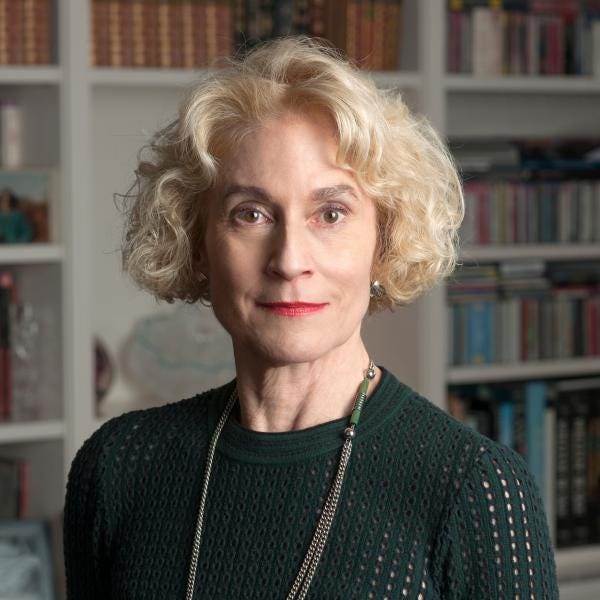That Time I Wrote a Paper for Agnes Callard on Love
Last week, The New Yorker profiled University of Chicago Professor Agnes Callard's divorce and second marriage to a graduate student. Ignorant of this, I wrote her a course paper on love.
Agnes Callard’s faculty office was decorated in a manner partway between a child’s bedroom, an art studio, and an Andy Warhol installation.
I entered, and as I sat down, I commented on how cool the decor was (unlike the stale bookshelves of the male professors).
We discussed my upcoming presentation and class discussion for her course, Moral Psychology of the Emotions. I had chosen our reading of Martha Nussbaum, “Emotions as Judgments of Value,” from her book Upheavals of Thought: The Intelligence of Emotions. Nussbaum is the highest-profile philosophy professor at the University of Chicago, a successful female philosopher, and clearly Callard’s model. While Nussbaum’s assimilation of emotion to judgment captured the objective purport of emotion, I pressed Callard on the idea of emotion as passive, as in the Stoic idea of “the passions,” which Nussbaum meant to be perpetuating. Emotions come upon us; we are not in control of them.
From her response, I could tell she either didn’t understand what I was getting at or didn’t like it.
Later in the conversation, having read her inaugural piece of public philosophy in the New York Times on God, I complimented her writing and mentioned that I came from a religious school, Wheaton College, and perceived that she and Ben Callard - another faculty member, whom I took to be her husband - were on the wing of the UChicago philosophy faculty most sympathetic to religious philosophy. To which, I remember, she nodded her head, but a bit uncomfortably. I wasn’t quite striking a chord.
Moments later, there was a knock on the door, and a young man I recognized as Arnold Brooks, the resident grad student turned temporary faculty, handed her a coffee. She thanked him, and we continued a bit more. I remember asking her to write me a recommendation for Ph.D. applications, to which she expressed openness.
She seemed in a rush to get on to the next thing, so I thanked her profusely for her time and attention and excused myself.
That is what I remember of our meeting.
A “Marriage of the Minds”
As The New Yorker profiled last week, Agnes and Ben Callard divorced in 2011, merely weeks after grad student Arnold Brooks expressed his love for Agnes. This was well before the February 2018 meeting I am recounting.
Students later told me that, indeed, the Callards were no longer married, and that Agnes had married Arnold Brooks. (Not to be confused with the American Enterprise Institute’s Ar-thur Brooks.) They told me the folklore of an evening lecture the Callards put on, defending their divorce philosophically. I was put off, to say the least. I never followed up with Agnes Callard to ask her to write my Ph.D. recommendations.
That is just as well, for she wasn’t exactly thrilled by my course paper for her, Intimacy and Otherness: Toward a Union Account of Love. Given that I was decently competent, (or grade inflation, if you prefer,) her disregard was only shown by an A-. But that was enough for me to prefer other professors as recommenders.
Seeing The New Yorker air the dirty laundry of Callard’s divorce from Ben and marriage to Brooks, the details of my own interaction with her only gradually returned. The first thing I found distasteful about the piece was Callard’s romantic following of her emotions, not a particularly unique or philosophical stance, but rather the default of our romantic culture. Then it occurred to me that the course I had taken from Callard was “Moral Psychology of Emotions,” not irrelevant to the topic at hand. It took a bit longer to remember that the paper I had written for her, which she hadn’t adored, was on love. Then, I eventually recalled that it was during our meeting, when Brooks had brought her a coffee, that I first realized the last name she and Ben Callard shared might not have had the significance I had thought.
I realized I had the makings of a thought piece.
The Nature of Love
The paper I wrote, which I have uploaded to Academia.edu for your reading pleasure, contrasts two accounts of the nature of love, a “union” account and a “robust concern” account. The union account explains the intimate and passionate nature of love in terms of the melding of the identity of the parties; I love you insofar as I have come to identify myself and my good with you and your good. The objection to this account is that it reduces other-love to self-love, and hence, love to mere egotism. Love must be concern for another truly recognized as other.
That is the launchpad for a robust concern account of love, which views love as, indeed, robust concern for another. Love must be concerned for another for his sake, not for one’s own. Love must be disinterested, if affectionate, if it is truly to respect the otherness of the other.
However, the robust concern account blurs the line between love and compassion, charity, and other such disinterested forms of concern. A robust concern account of love lacks the intimacy of love.
In the paper, I detail the attempts of various analytic philosophers to escape from the coldness of robust concern accounts of love, to varying degrees of failure. None of them are able to do it. And I identify a liberal individualist ideology as the root of this failure. One of the writers, Bennett Helm, tries to preserve the otherness of the other by even saying that love respects the other’s right to define his or her own conception of his or her good. Love is therefore concern for another person that they achieve subjective fulfillment by his or her own lights. It is disinterested, hands-off, no-judgment cheer-leading for another’s subjective pursuit of happiness.
But that is individualist and liberal, and for those reasons, not love. When you love someone, you don’t want them to achieve whatever they think will bring them happiness. You want them to achieve what will actually bring them happiness, or better, what will actually be their highest good. People who love each other are most willing to interfere in the other’s pursuit of individual and subjective happiness. In fact, as Roger Scruton puts it, “I may fight against your career, your friendships, your activity — everything, in short, that gives you the chance to live happily without me.” Love is not disinterested, robust concern.
This brings me back to Agnes Callard’s “marriage of minds.” First, a general property of love between the highly successful: When people are taken to be individuals pursuing their own happiness and success, love for another can be, at best, support for another’s success insofar as it does not affect one’s own success and without wanting one’s own interests to in any way hamper the other’s success. This is the regard or esteem of two careerists for each other. At the height of this form of “love,” people’s love relationships are contingent on the alignment of their professional goals. If careers diverge, love respects the atomistic interests of the other professional, and the two part ways.
In this particular case, of course, the professional details are different. It is Agnes Callard’s career that is paramount. In the first instance, though both she and Ben were well-qualified by their Ph.D. from Berkeley, it was she, the female philosopher, who earned a position at the University of Chicago. She finagled a lowest-tier lecturer position for her first husband, at which tier he remains. He is lucky to have retained that lectureship in the absence of his marriage.
And, as The New Yorker details, her second husband, Arnold, is not nearly as ambitious as she. Likewise, with a Ph.D. from the University of Chicago, he would be unlikely to be able to teach at the University of Chicago, as most academics can only teach at a university a tier below the one at which they were trained. (The most trusted ranking of American philosophy Ph.D. programs rates Berkeley ninth, and Chicago somewhere in the mid-twenties.) So, in fact, the possibility of her marriages depends professionally on her husbands being less ambitious (though, of course, they are rewarded significantly professionally for their marriages, with no further ambition remaining necessary).
A purer example of liberal individualism can be seen in the example of Callard’s model of a successful female philosopher, and her senior colleague, Martha Nussbaum. Nussbaum’s marriage ended early, after only one child. She kept her husband’s name and Jewish identity, while maintaining a string of relationships with very successful men, most memorably, Amartya Sen, with whom she developed an influential philosophical account of distributive justice.
Nonetheless, the vision of two philosophers interested in each other in a sort of disinterested way comes through in the description of Agnes Callard’s relationship with Arnold Brooks. There are contradictions insofar as marriage depends on departing from liberal individualism, but it appears that she continues to pursue a sort of idealized philosophical partnership, a Platonic marriage, if you will.
Callard also reveals that she suffers from autism, which makes sense, given her very sex-atypical path and psychological profile as a high-powered female philosopher. But her autism reveals itself in a divide between the rational and emotional in her. This is a divide that extends to much of our society and to modernity itself, but which is augmented by autism. Stereotypically rational people try to ground everything in their life in rationality, but emotion and passion end up having their revenge. This comes out in the modern philosophical marriage of scientism and subjectivism. In one stroke, moderns argue that all thought should be based on rationality and science, and that art, morality, and taste are all matters of mere emotion and psychological preference. Thus, the vast majority of individual human life is freed of any intellectual or normative standard.
Romanticism and Romance
In Callard, one sees a combination of extreme rationality, characteristic of any high-ranking academic and philosopher, but especially of an autistic one, especially as it is rare and unique among women. On the other hand, her reasonings about marriage reflect an utterly banal and unoriginal romanticism, ably skewered by the far superior philosopher of emotion Alain de Botton in his many books. According to De Botton, in leaving religion behind, modern society places all of its hope in romantic love. But this places far too much of a burden on marriage and on an individual. Instead, De Botton argues that we all married the wrong person. The point of marriage is to introduce an element of commitment and control of emotion that provides stability and an occasion to display the classical virtues, rather than those of modern romanticism and authenticity.
Of course, in committing, one takes a risk. One forecloses the possibility of seeking individual happiness apart from this individual. One yokes oneself to another. Our fates are dependent on each other. Individual and subjectively-defined happiness both go out the window. We take it that there is a single good for the two of us; that I will prefer misery with you to happiness without you.
This is to say that love involves unity; we are back at a unity account of love. In loving someone, I no longer see myself as separate or the other as separate. The idea that this is a form of egotism or dissolving another into oneself is simply absurd. We remain distinct human beings, but we are unified in relationships of varying levels of intimacy, and on a spiritual, emotional, and ethical level, and in marriage at least, on a physical level as well (while retaining our physical distinctness).
Scruton develops the unity account in this way: “Love in all its forms involves a desire for another’s good. But I too am implicated in that good; I identify myself with it, and act to secure it as though it were mine. … Love is therefore essentially ‘interested,’ and never more so than when it is disinterested.”
The reader will notice that there is nothing unromantic about this vision of love. This union account of love is not opposed to romanticism in a way that involves denying passion or insisting that marriage be for utilitarian reasons, dropping its romantic pretensions. Au contraire, its romanticism drops the subjectivism of modern romanticism, the slavery to passion that occurs when one frees passion and emotion from all objective evaluation.
Rather, this account of love views passion, a natural force, as something that rightly arises within certain given structures of relationships but that is also bounded by those relationships, which have an ethical character. The ethical does not follow the natural, as if it was most ethical to be authentic to one’s passions. But neither is love merely something ethical, something we will out of duty. Instead, as Hegel puts it, “Love is feeling, that is to say, the ethical in the form of the natural.”
Hegel continues, in a way that should be reformatted and read as poetry:
The first element in love
is that I will to be no longer an independent self-sufficing person,
and that,
if I were such a person,
I should feel myself lacking and incomplete.
The second element
is that I gain myself in another person,
in whom I am recognized,
as he again is in me.
Hence love is the most tremendous contradiction,
incapable of being solved by the understanding.
Marriage Against Individualism
There is a whole philosophy of life that Agnes Callard’s marital proceedings illustrate, call it Liberal Individualism. Its liberalism is not exclusively of the left, nor its individualism of the libertarian right. It is a pervasive sense that life is all about us, alone, seeking subjective happiness, through career and romantic love. Modern, that is, second- and third-wave feminism illustrate this well, not by what they recommend but by what their recommendation assumes. They recommend that women be free from the procreative responsibilities that romantic, sexual love otherwise places on them in order to have success in the capitalist marketplace. What this assumes is the “male model” of life as career, an unencumbered individual pursuing status through the solitary climbing of status hierarchies.
What I have learned in life and what I want to recommend to, not only my readers but also the world, is that marriage interrupts liberal individualism - a liberal individualism which, by the way, all those of us, whatever our political proclivities, are inclined toward. Marriage derails career. Family inhibits success. Children wreck productivity.
But by the same token, what marriage offers us is a place outside the brutal status hierarchies of public and market life. They offer us a realm in which we are loved, not for what we bring to the table, but for the relationship we bear to another, whether of husband, wife, mother, father, brother, or sister, and so on.
But the cost of love is that we give up the quest for self-fulfillment, for career success, even for perfectly living out our philosophical theories. But in giving this up, we find that we gain ourselves in others in whom we are recognized, and they again in us.
It is the office of a philosopher to rise above the spirit of the age, to give expression to the universal, rather than the parochial prejudices of her social milieu. By this standard, Agnes Callard fails to live up to the idea of a philosopher. But for that, she deserves our sympathy, as do all who are beholden to the spirit and the ideologies of the age, to the prejudices of elite liberal society, and to their own passions.










Really enjoyed this, Joel. The only line that didn't land for me was this one from Scruton: "I may fight against your career, your friendships, your activity — everything, in short, that gives you the chance to live happily without me." Perhaps we can discuss later today.
P.S., I think the A- was due to your competence, not grade inflation.
Thank you for one of your best, Joel. I see you working in here against Let Go and Let God, in the romantic context.
I also see an underlying assumption that our identity and significance are in Christ, not in our professional performance. And a new idea to me: that marriage and children help us grow in this direction, if we cooperate with the Lord. They are better training grounds for this doctrine, most of the time, than careers or vocations or journalism or other callings.
Thank you for this essay.